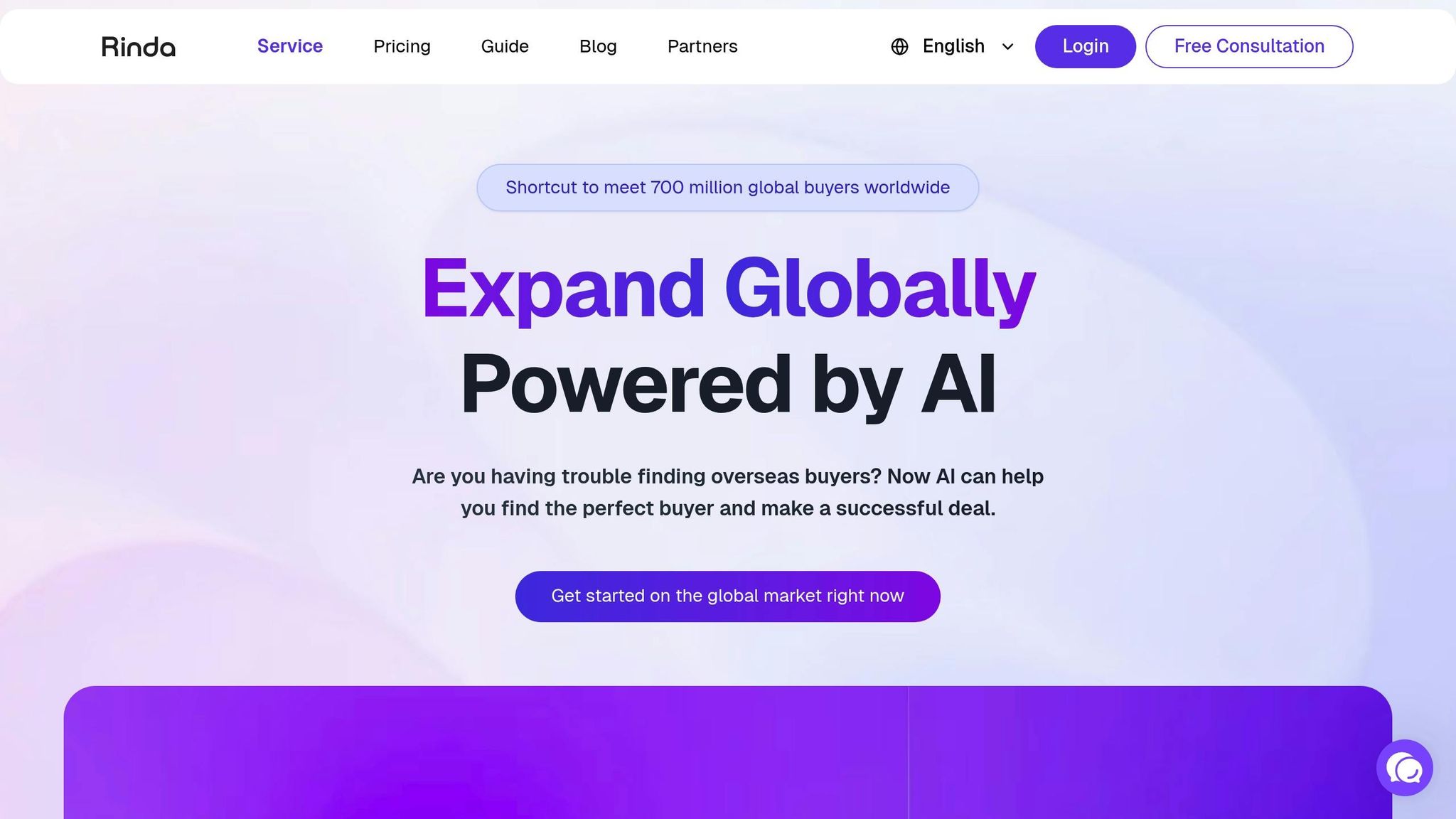Global Expansion in 2025: Why 56% of US Startups Are Betting on AI-Powered International Growth
Explore how US startups are harnessing AI tools for efficient global expansion, tackling challenges like market entry and communication.

Global expansion is no longer the exclusive domain of large corporations. In 2025, 56% of US startups are leveraging AI-powered tools to overcome challenges like market research, multilingual communication, and regulatory complexity. These technologies are transforming how businesses enter international markets, offering faster and more efficient solutions to scale globally. The result? A new era of opportunity for startups to compete on a global stage with fewer resources.
In this article, you'll discover:
- How AI tools streamline global market entry by automating lead generation and regulatory compliance.
- Key trends driving international growth, including access to untapped markets and global talent.
- Practical examples like RINDA's platform, which simplifies multilingual communication and buyer discovery.
As businesses face increasing competition and complex international demands, adopting AI-driven strategies is no longer optional. By acting now, startups can position themselves for sustainable growth in a rapidly changing global economy. Read on to learn how AI is reshaping global expansion and what it means for your business.
Global Expansion for Startups
AI-Driven Global Expansion in 2025
Artificial intelligence is changing the way US startups approach global markets, offering tools that streamline market research, localization, and multilingual communication. These advancements allow businesses to enter multiple markets simultaneously, creating new opportunities for growth and investment.
AI Adoption and Market Growth
The demand for AI-powered tools in global expansion has surged as startups aim to scale their operations more efficiently. Automation improves processes like lead generation and communication, helping companies operate with greater precision. This efficiency has not only fueled market growth but has also attracted significant interest from venture capitalists. Their investments reflect growing confidence in AI as a key driver for staying competitive in international markets.
Key Drivers of International Growth
Several factors are pushing US startups toward global expansion, with AI playing a pivotal role. Startups are increasingly looking to diversify their revenue streams and tap into untapped opportunities abroad. AI tools provide valuable insights that help businesses identify promising markets and fine-tune their strategies for acquiring customers. These technologies also pinpoint underserved international segments, cutting down the time and costs associated with traditional expansion efforts.
Another critical factor is access to global talent. AI platforms assist companies in identifying regions with skilled professionals and favorable hiring conditions, making it easier to build international teams.
Adopting AI-driven strategies for global growth is no longer optional - it’s becoming essential. Startups that leverage these tools early are gaining a competitive advantage, enabling them to navigate the complexities of international markets with speed and efficiency in today’s dynamic business environment.
Global Expansion Barriers and AI Solutions
Expanding into international markets presents exciting opportunities, but US startups often encounter significant hurdles along the way. Traditional barriers that once seemed daunting are now being tackled head-on with AI-powered solutions, reshaping how businesses approach global growth.
Common Barriers to Global Growth
Navigating the complexities of global expansion can be overwhelming. One of the primary challenges is regulatory complexity. Each country has its own unique set of business regulations, tax codes, and employment laws, which can create delays and complicate market entry.
Another major hurdle is overcoming language and cultural differences. Startups need to understand local customs and communication styles to build trust and avoid missed opportunities.
Finding and verifying international buyers is also a time-consuming process. Traditional methods often rely on expensive consultants or manual research, making it difficult to identify credible prospects.
Finally, managing talent across borders adds another layer of difficulty. Recruiting professionals who are familiar with local employment laws and workplace norms requires significant effort and resources.
How AI Removes These Barriers
AI is stepping in to address these challenges with precision and efficiency. For instance, AI-powered tools now support multilingual engagement, offering automated translation and cultural adjustments to help businesses communicate seamlessly in over 20 languages.
When it comes to finding the right buyers, automated discovery tools streamline the process by filtering prospects based on specific criteria and verifying their legitimacy. This significantly reduces research time and associated costs.
Some platforms take it a step further by integrating employment compliance solutions, simplifying the complexities of hiring and managing a global workforce. These tools help businesses navigate local labor laws and reduce administrative burdens.
A standout example of these advancements is RINDA, a platform that combines buyer discovery, credibility verification, and multilingual communication. RINDA automatically crafts personalized outreach strategies for various markets and uses performance data to refine its approach. This allows startups to explore multiple international markets at once, transforming the cost and scalability of global expansion. By addressing regulatory, cultural, and operational challenges in one system, RINDA exemplifies how AI can revolutionize international growth strategies.
Case Study: RINDA's AI-Powered Global Sales Automation

When it comes to breaking down barriers to international expansion, RINDA has positioned itself as a standout example of what’s possible with AI-driven global sales automation. As more U.S. startups seek efficient ways to enter international markets, RINDA provides an all-in-one platform that removes the usual hurdles of high costs and lengthy timelines. By combining smart buyer discovery with advanced multilingual communication tools, RINDA addresses the common challenges that often slow global growth.
The platform streamlines the entire offline sales process, from identifying prospects to optimizing performance. This level of automation is particularly beneficial for startups that lack the resources to maintain dedicated sales teams in multiple regions.
Key Features of RINDA
RINDA’s platform is built around intelligent buyer discovery, which automatically identifies and verifies potential customers across international markets. Using real-time interest checks and credibility assessments, the system ensures startups engage with genuine prospects actively seeking their solutions.
Its multilingual communication tools support over 20 languages, enabling companies to create personalized outreach strategies that respect local business practices and preferences. This tailored approach ensures that messaging resonates with diverse audiences worldwide.
The platform also includes performance analytics and ongoing optimization, allowing startups to refine their strategies based on actual results. By identifying the markets that respond most effectively, businesses can adjust their efforts to maximize impact. Additionally, RINDA customizes buyer engagement strategies by factoring in industry, company size, and regional nuances, ensuring outreach is relevant and effective.
These features collectively make RINDA a powerful tool for startups aiming to achieve global success.
Success Stories with RINDA
RINDA offers tiered pricing plans designed to accommodate startups at various stages of growth. With entry-level plans that include risk-free guarantees, the platform appeals to businesses looking for a secure way to explore international markets.
For enterprise clients, RINDA provides unlimited access to lead searches, data enrichment, and email functionalities. These features are paired with dedicated account management and detailed analytics reports, ensuring that sales representatives are well-prepared to navigate specific market dynamics.
Data Analysis and 2025 Outlook
As AI-driven solutions continue to shape the business landscape, data analysis offers a clearer picture of how these technologies are influencing international expansion. The growing reliance on AI among US startups highlights a shift in global growth strategies. Traditional methods are being replaced by AI-powered approaches, reflecting a broader recognition that staying competitive in today’s global market demands innovation. This trend aligns with the strategies and examples discussed earlier, emphasizing how AI is becoming a cornerstone of effective international expansion.
Key Statistics on AI Adoption
Recent data reveals several trends reshaping the startup ecosystem through AI integration. For instance, incorporating AI into operations like ERP systems and regulatory compliance simplifies complex processes, making them more efficient. Additionally, startups leveraging AI-powered communication tools are overcoming language and cultural barriers, enabling faster entry into new markets.
Businesses adopting comprehensive AI-driven strategies report significant improvements in areas such as lead generation, compliance workflows, and resource management. Early findings show that these AI-powered approaches consistently outperform traditional expansion methods, providing a measurable edge in efficiency and effectiveness.
Future Trends and Opportunities
Looking forward, emerging trends highlight the growing role of AI in transforming global expansion strategies. For example, advancements in multilingual AI tools are expected to eliminate communication barriers, allowing businesses to engage with diverse markets more effectively. Similarly, combining real-time market intelligence with AI-driven sales automation will equip companies with the flexibility to adapt quickly to shifting market conditions.
Another area gaining momentum is regulatory compliance automation. As international regulations become increasingly complex, AI systems designed to navigate these challenges are becoming indispensable for maintaining smooth operations across multiple jurisdictions.
These developments suggest that the competitive advantage once enjoyed by early adopters of AI is rapidly becoming a baseline requirement. Companies that delay integrating AI into their global strategies may find themselves at a disadvantage in an increasingly automated and fast-paced marketplace.
Key Insight: By 2025, AI-driven global expansion will no longer be a competitive edge but a fundamental business necessity. This underscores the urgency for companies to embrace AI as a core component of their international growth strategies.
FAQs
How are AI tools helping U.S. startups break into international markets more effectively?
AI tools are reshaping how U.S. startups tackle the complexities of expanding into international markets. They address critical hurdles such as regulatory compliance, data privacy, and inefficiencies in operations. By automating and streamlining the localization of content, these tools help businesses engage effectively with diverse audiences while meeting local requirements.
Moreover, AI-driven market analysis offers deep insights into customer preferences and emerging trends across regions. This allows startups to fine-tune their strategies for specific markets, driving growth and building a solid global presence. With the support of AI, businesses can navigate the challenges of international expansion with greater confidence, maintaining both agility and a competitive edge.
How does AI help startups find and hire top global talent for international expansion?
AI is reshaping the way startups find and hire skilled talent from around the world, enabling quicker and more efficient international growth. With advanced tools, AI can sift through extensive talent pools across various countries, align candidates' skills with specific job needs, and simplify the recruitment process. It helps overcome challenges like differing time zones, language barriers, and cultural differences.
Moreover, AI-driven platforms streamline onboarding by automating routine administrative tasks and ensuring adherence to local regulations. This frees up startups to concentrate on scaling their operations while assembling a diverse, highly qualified global team that supports their strategic objectives.
Why are AI-driven strategies critical for US startups planning global expansion by 2025?
AI-driven strategies are quickly becoming a cornerstone for U.S. startups planning to expand globally by 2025. These technologies help break down traditional barriers to entering international markets by streamlining operations, improving decision-making, and enhancing customer engagement. This adaptability allows startups to navigate diverse markets effectively and maintain a competitive edge.
With AI, startups can scale operations more efficiently by automating repetitive tasks and tailoring customer experiences to individual preferences. These capabilities are essential for building trust and gaining momentum in unfamiliar regions. As AI technology continues to advance, adopting these tools has shifted from being optional to becoming a critical factor for sustainable growth and innovation in today's interconnected world.
